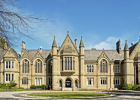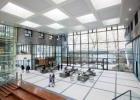Kamil Kwiatkowski
中美洲,哥斯大黎加
科管所 Kamil Kwiatkowski
1. Academic part
INCAE Business school is a university located in Central America. It has its campuses in
Nicarague and Costa Rica. It was set up on request of USA President JF Kennedy by Harvard
Business School. It claims to be the best business school in Latin America.
INCAE is the business school with the highest ratio of doctoral-level, full-time professors in
Latin America.
INCAE actively uses the case method as a participative methodology that leads to the
development of an exceptional analytical ability which cannot be acquired through
conferences and presentations. A case is a document developed in cooperation with company
executives. It shows all the necessary dimensions of the business for students to analyze a
particular situation thoroughly and suggest alternative courses of action to solve the problem.
INCAE’s teaching methodology focuses on the participant, encouraging a comprehensive
learning experience through methods, case discussion, group work, management simulations
and self-training activities.
The INCAE MBA is a full-time two-year program. Each academic year is divided into two
semesters and each semester is currently divided into two modules of 8 weeks each. The
structure will change for students coming in the fall semester of 2011. All core courses are
taken during the first year. During the second year students take all their electives and
concentrations. It is possible to focus on the following areas: General Management, Industry
and Technology Management, Sustainable Development, Business Economics and Finance,
and Marketing (Nicaragua campus only). In addition to all the elective work, INCAE students
must carry out their Management Consulting Practice (MCP) or fieldwork, traditionally
known as Trabajo de Campo. This assignment is planned months in advance and takes place
during the second module of the first semester of second year (October to December 2010;
January to March 2012).
School policies are very strict and students need to commit to the program full-time moving to
the campus housing. Every first year course is to special grading called S curve. It means that
certain amount of people has to fail the class and the grades are also distributed accordingly.
That is why there is very strong competition among students and it makes the program very
famous and valuable among future employers.
Exchange students can take only second year courses which are “easier” and professors are
not that great as in the first year. The courses are both in Spanish and English. The surprise
came when I enrolled to 5 courses and when I reached Costa Rica the coordinator informed us
that last minute changes applied and some of the courses will not be provided in English, but
we will get simultaneous translation. It was very inconvenient and some students, including
me, decided to drop the courses.
Students must take 3-5 second-year courses per module (or 9 credit hours minimum).
Language requirement: TOEFL (90 minimum or equivalent). Students must be able to
actively participate in class discussions regardless of the language of instruction of the course.
Depending on the requirements of their home institution, exchange students may take courses
only in English or only in Spanish. Keep in mind that a working knowledge of Spanish is
necessary to get around campus and town.
Methodology: 70% case study analysis and discussion, and 30% lecture. The specific method
depends on the nature of the course. However, all courses are very demanding and students
have to be prepared. Class participation can be 60% of the final grade in some cases. Students
are expected to read and prepare all the material assigned individually and to check their e-
mail regularly for last-minute instructions from professors, even during the weekend or
holidays (Easter Week).
Below you can find courses available for Fall semester. From courses I took and audited I can
truly recommend Supply Chain Management and Global Macroeconomic Trends. The second
one is conducted by Alberto Trejos, ex-Ministry of Foreign Affairs who negotiated CAFTA
with USA. I do not recommend Corporate Strategy nor Family Enterprises.









